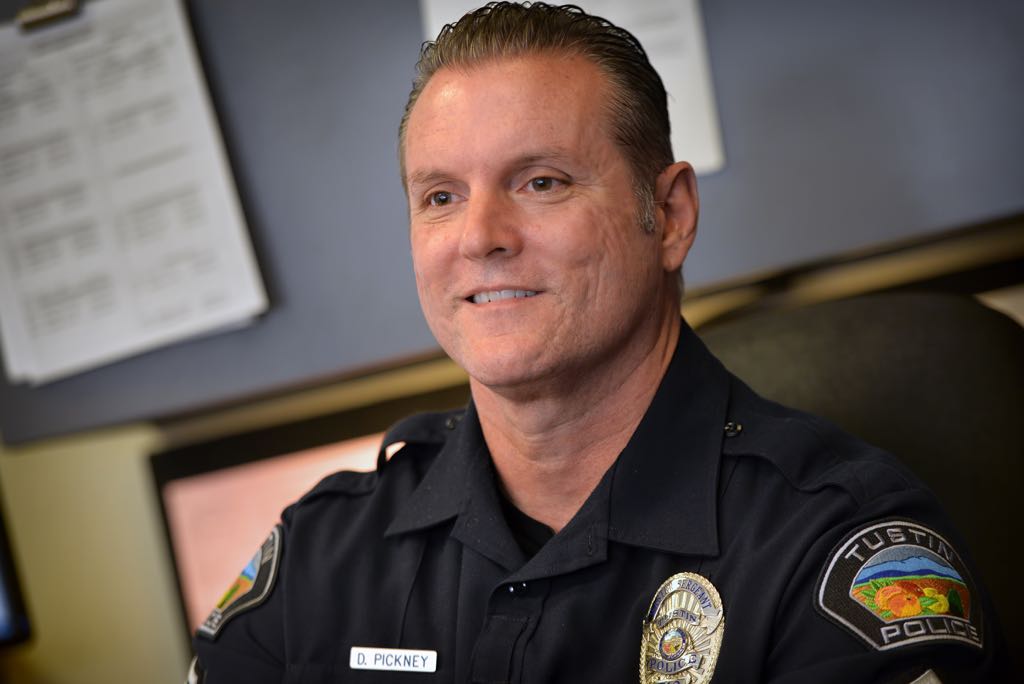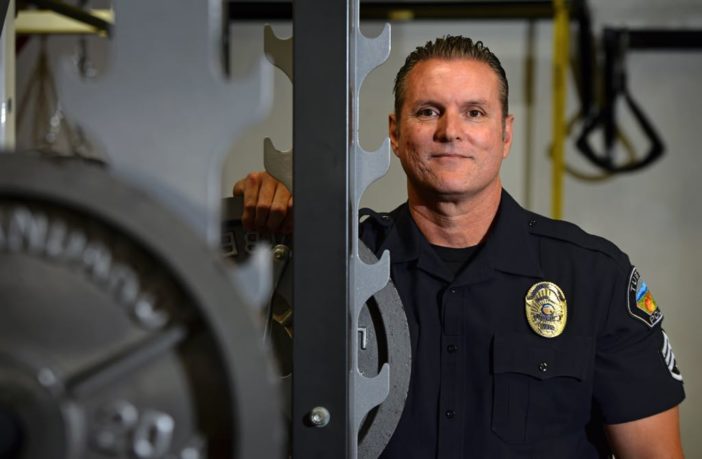He had 15 minutes to get out.
With searing pain barreling through his chest and down his arm, Tustin Sgt. Del Pickney was intently focused on the clock.
In just 15 minutes, the next shift of officers would report for 6 a.m. briefing and they would see him there, lying on the floor of the Watch Commander’s office.
Pickney, 49, had one recurring thought as he unsuccessfully tried to block out the pain: “OK, the medics take a few minutes to get here, but I should be out before anyone comes in.”
“I didn’t want my guys to see me getting carted out on a gurney,” he said. “They’d never let me live it down.”
He half-wished what he was experiencing was worthy of a call to paramedics.
“It better be a heart attack,” Pickney said he remembered thinking. “If it’s not a heart attack, for the rest of my career, I’m going to be known as the ‘fake heart attack guy’.”
He made the call and the paramedics arrived. As the reality of the situation settled in as the paramedics worked on him, Pickney’s thoughts shifted.
“I remember being in the ambulance not knowing if I was going to make it out of this,” he said. “And I remember thinking about just three things: my wife, my children and my relationship with God.
“I didn’t think about anything else.”
***
Despite having somewhat of a sweet tooth with a weakness for white cake with white icing, Pickney was healthy and in good shape.
Before every shift, he would hit the gym at the Tustin PD for an hour — weights, high-intensity cardio, pushups.
But the morning of March 3 felt different.
The workout seemed harder that day; he couldn’t push as much, he said.
When he went to report to the Watch Commander’s office to get ready for his shift, he felt nauseated.
Pickney lied on the floor.
A few other sergeants were in the room and asked if he was OK.
“I told them I must be coming down with a bug or some kind of flu,” he said. “I had no idea it was a heart attack.”
He got up, tried to relieve the nausea, then collapsed in extreme pain.
“As police officers, we’re well-versed in the signs and symptoms of a heart attack, but when it’s happening to yourself you think of everything else but a heart attack,” he said.
At first, he refused to call an ambulance, sure the pain would pass.
But as the intense sensation radiated down his arm, he knew he needed help.
“I couldn’t ignore it any longer,” Pickney said.
He ended up suffering what doctors said was a massive heart attack. He had a complete blockage of the left anterior descending artery.
“I have never been fearful on a call in my entire career,” he said. “This was the first time I was fearful at work.”
Just weeks earlier, Pickney had a physical and everything looked normal. Numbers on his blood test showed he was not at risk for a heart attack, he said.
“Sometimes no matter what your number or test results are, it may or may not mean anything,” he said.
Pickney’s wife stayed by his side during his four-day stay at the hospital. His two daughters, ages 12 and 15, and Tustin police family also visited.
“At one point, I had to send an email to ask people to stop visiting because I just couldn’t handle the number of people who wanted to stop by,” he said. “Everyone was really supportive.”
Pickney thought he was through the worst of it, but then doctors gave him news he wouldn’t accept.
“They told me it would be nine to 12 months before I could get back to work,” he said. “I didn’t want to do that.”
Pickney searched for a cardiologist that would be as aggressive as he wanted to be in his recovery.
In just five weeks, Pickney made the necessary improvements in rehabilitation to return to work.
April 7 marked the sergeant’s first day back.
“I think everyone was happy to see I pushed to come back,” he said.
“Getting wheeled out on a gurney from a place you’ve worked at for 27 years, I needed a victory.
“Coming back quickly was one of my victories.”

Sgt. Del Pickney returned to work just five weeks after suffering a massive heart attack. He currently works light duty but will be able to supervise in the field starting in July. Photo by Steven Georges/Behind the Badge OC.
***
Pickney mans the Watch Commander’s desk on his shifts and is required to stay there — for now.
It will be a few more weeks before he can return to full duty.
That part is hard, he said.
“We have an emergency beeper and when that goes off, everybody runs out of the station and I just have to stay here,” he said. “I’m like a caged lion.”
The sergeant continues rehabilitation and said the prognosis is good — his heart suffered minimal damage and is responding well to treatment.
Pickney has made some lifestyle changes, including giving up desserts (although he’ll sneak a piece of white cake with white icing every now and then), and reducing stress. The latter sometimes is the more difficult of the two, he said.
As he sits behind the Watch Commander’s desk on a recent Wednesday, Pickney reflects on his story and said he doesn’t see his rapid return to work as noteworthy.
The former Marine, who raises money for wounded warriors through a softball league he runs with Tustin PD Lt. Jeff Blair, said there are more inspirational stories than his.
“When I see wounded warriors, and what they’ve overcome, a heart attack and back to work in a few weeks doesn’t seem like a big deal,” he said.
But much good will come of Pickney’s experience.
He’ll constantly remind himself about what matters.
“I try to view these things — my wife, my kids and my relationship with God — as what’s important in life,” he said. “I don’t worry about my job, or anything else.
“Beyond that circle of things, I didn’t think about anything else on my potential death bed.”
He’ll be a better friend, he says.
“Maybe if this can encourage people to get checked out, that is a good thing,” he said. “I’ve already have had friends in law enforcement emailing me asking me about which tests have done.”
He’ll be a better officer, too, he says.
“I will do a lot better job on medical-aid calls,” he said. “Now I know what it feels like to be that person on the ground, not knowing what’s going on and hearing everyone talk.
“I’ll be a more empathetic person.”
 Behind the Badge
Behind the Badge



